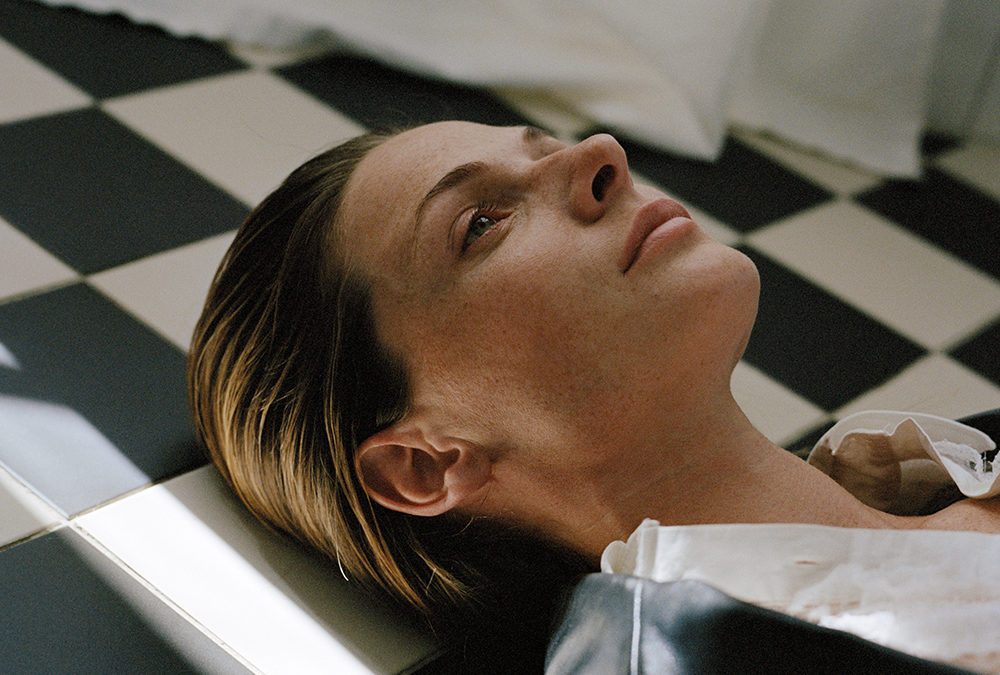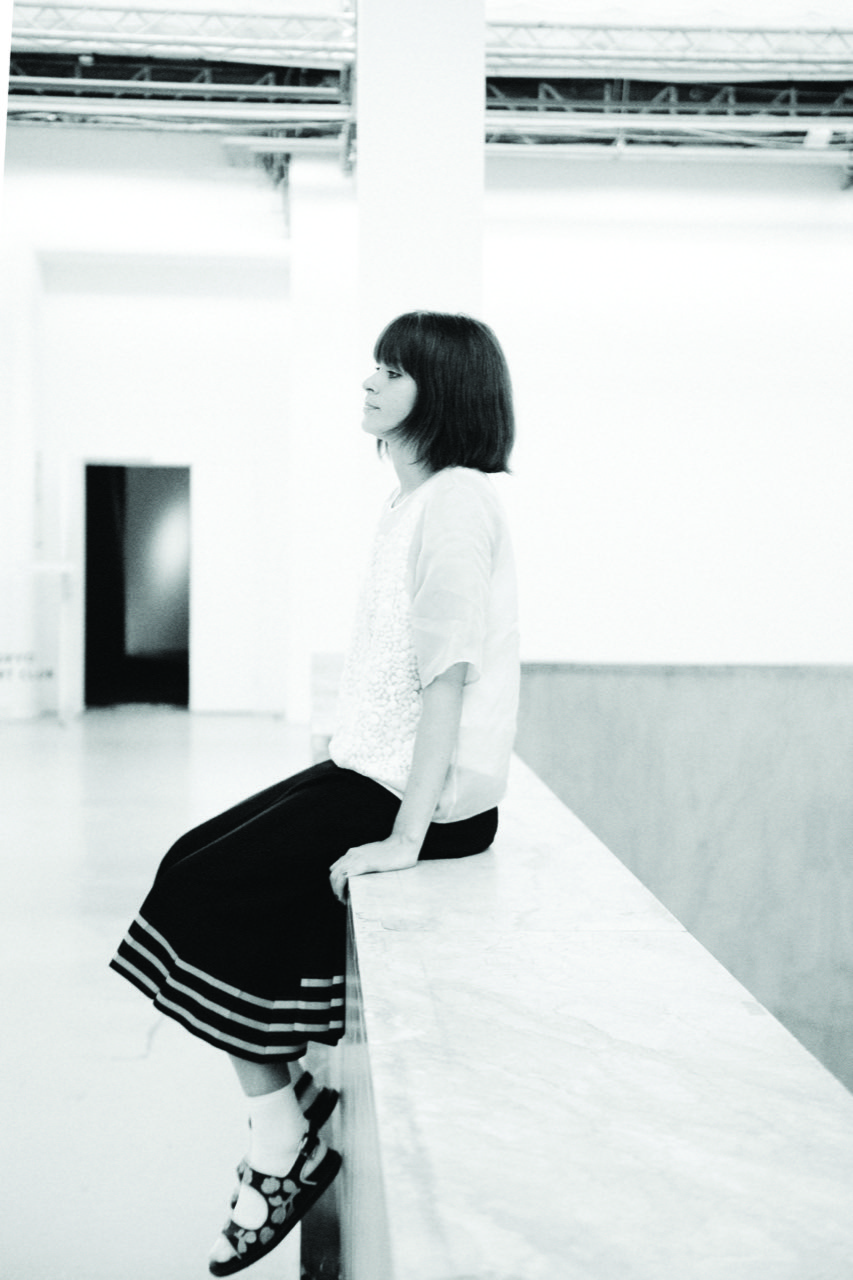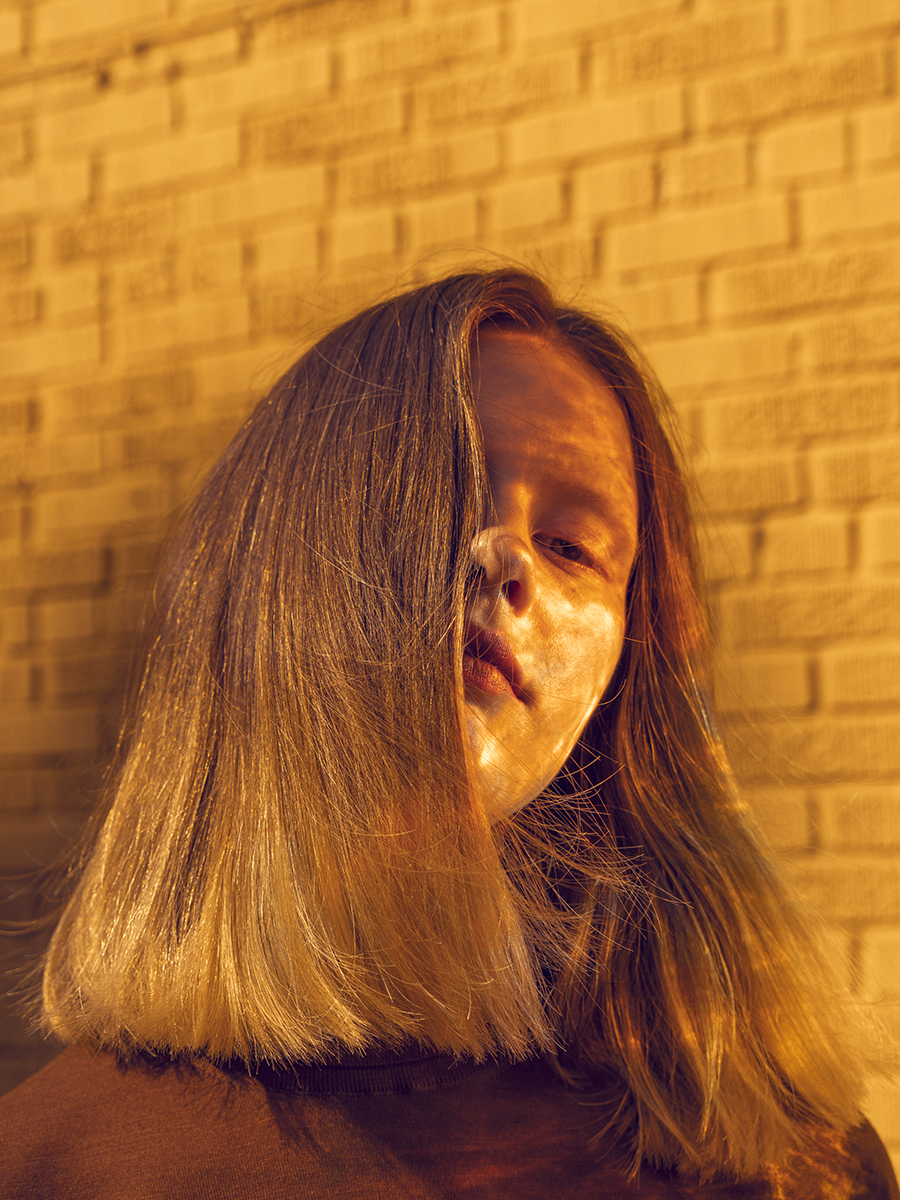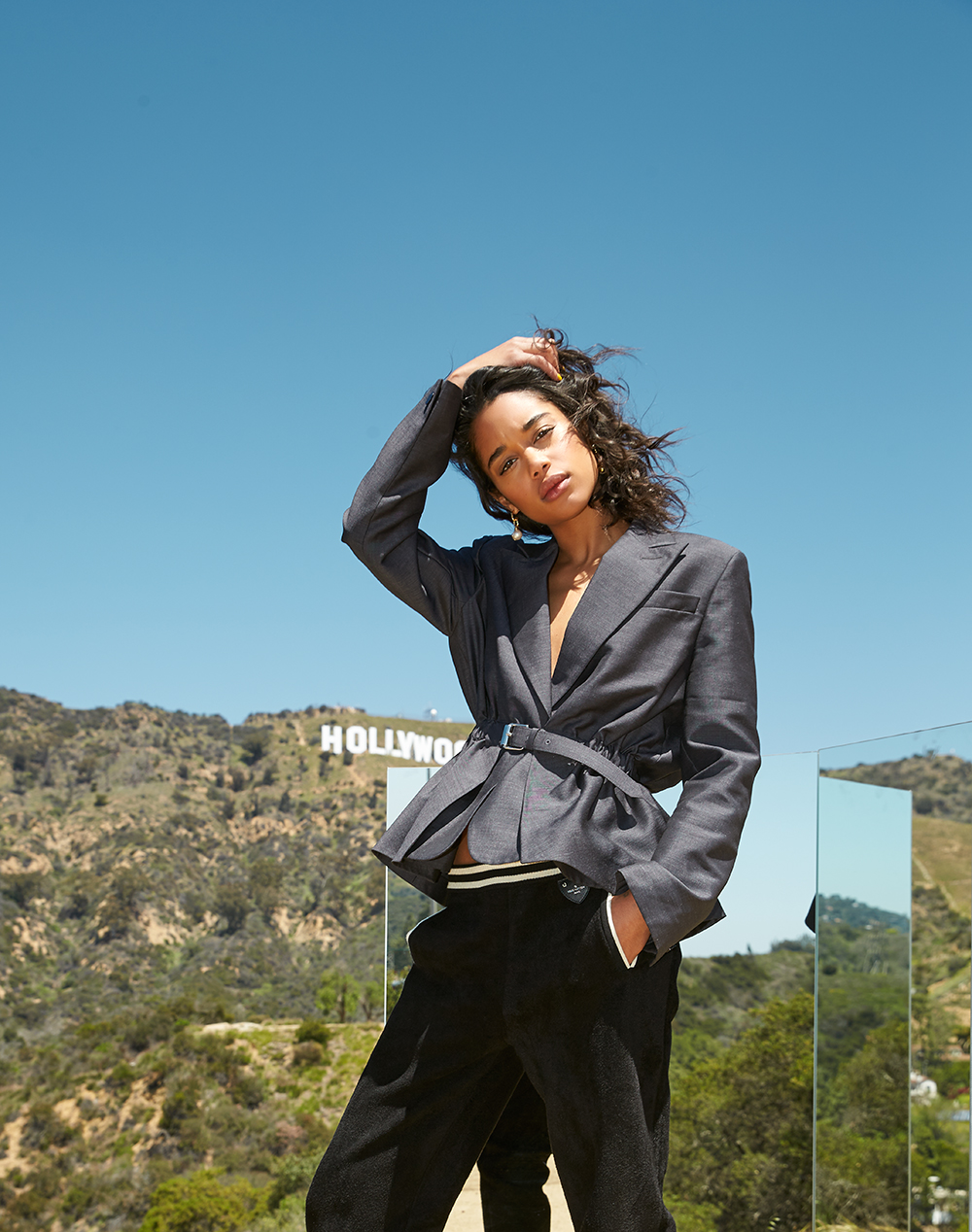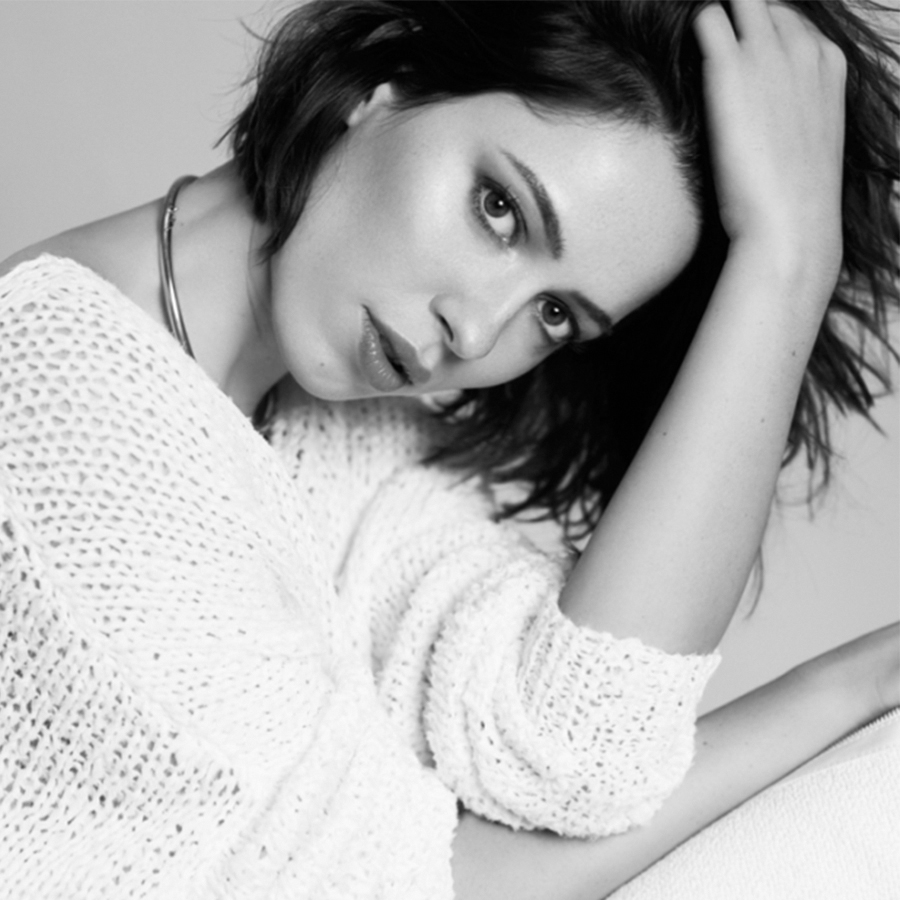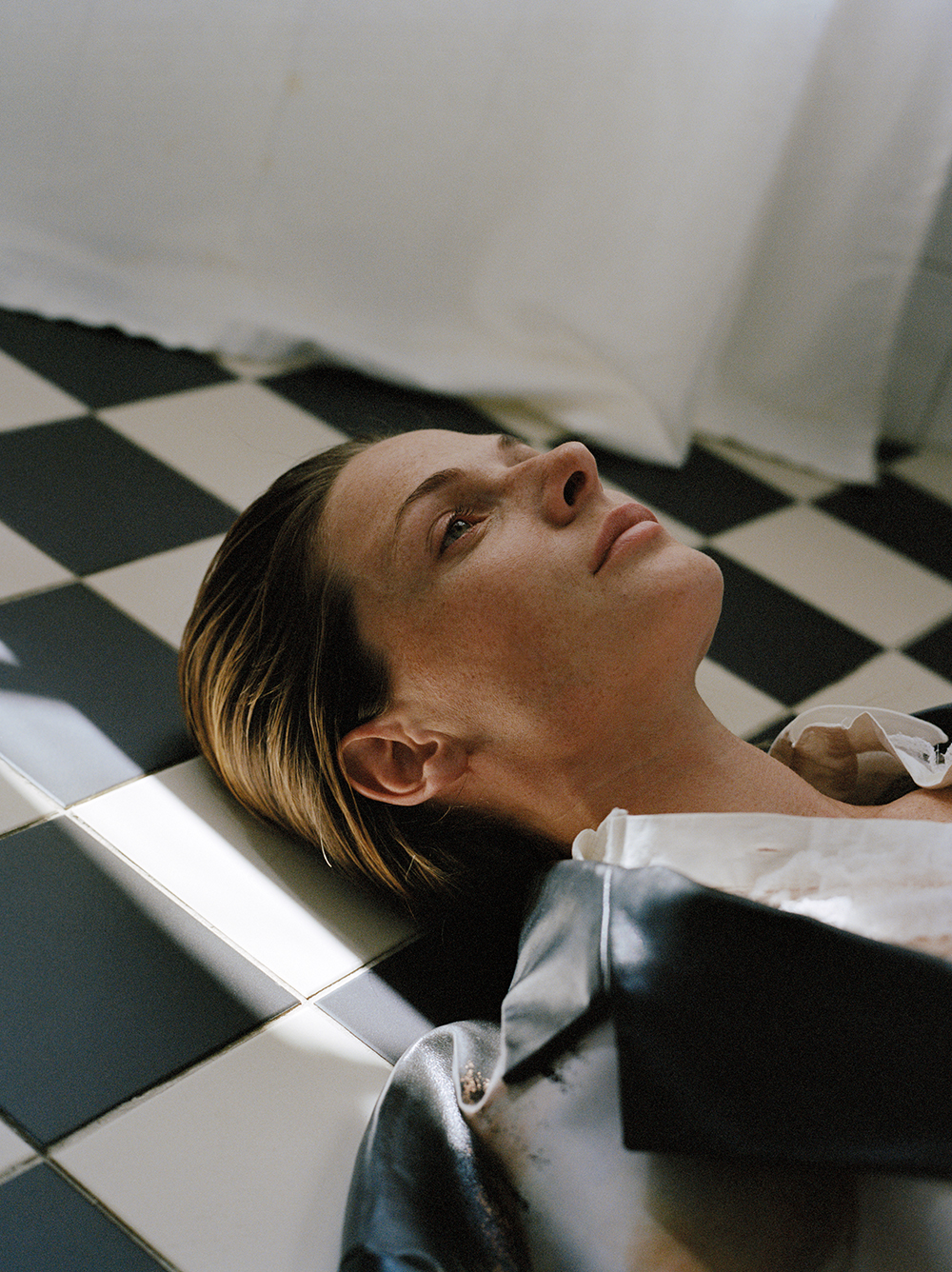
Shirt - Louise Lyngh Bjerregaard, Printed leather Coat - ACNE Studios
A MEETING WITH REBECCA FERGUSON
By Alice Butterlin
This interview was originally published in Crash #92.
After television and film roles in her native Sweden, Rebecca Ferguson first appeared before international audiences in the BBC series The White Queen. That is where Tom Cruise spotted and recruited the young actress to play Ilsa Faust, one of the most popular characters in the Mission Impossible franchise. After this first foray into the world of action movies, where physical training and martial arts are de rigueur, Ferguson continued with projects such as Life, where she plays an astronaut who discovers a form of life on Mars. She will soon appear in Denis Villeneuve’s adaptation of Dune, a film that boasts an impressive cast (Zendaya and Timothée Chalamet) and has already garnered eager anticipation by die-hard fans of the fantasy universe imagined by Frank Herbert fifty-five years ago.
How long have you been living in Sweden?
I was born in Sweden and lived here my entire life. Then I moved over to England about a year and a half ago but I still split my time between my little fishing village and London.
It’s important for you to have a base in Sweden?
Yeah, I have a thirteen-year-old son living there with his father. We’re all very close to each other so obviously where he is, it’s very important for me to be. We all travel, we’re kind of a circus family. (laughs) My son goes to school and it was important to us to not to break his structure and friends. Thirteen is an important age. But when we can, with his father and his father’s girlfriend we travel together and celebrate every holiday together. We just make it work.
What was your first encounter with film?
I don’t know how old I was, but I remember when The Beauty and the Beast came out. I recall being scared at first, but I still went to see it and I remember being upset, because I was in love with the Beast and when he turned into what everyone else thought was the perfect man, I thought his outcome was not as lovely as him as a monster. I wanted him to stay as the Beast.
When did you start thinking about acting as a career?
The funny thing is that when I was young, I never thought that I would be an actress. I was fifteen or sixteen when I was cast in a soap opera in Sweden. I did not like being on stage; I didn’t do drama at school. I just went to music school. I didn’t have many goals and dreams. I was one of those kids who just rode the wave of necessity. You need to go to school, you need to do this, you need to do that. You know the drill; they call it the school system. Then when I was asked to do this casting for a soap opera, it terrified me. I got the role and that’s when my interest in film started. I realized there was a world I could hide in. I could play characters and not take responsibility for them… And apparently people thought it was good. Good enough for me to continue.
How did you get asked to do that casting?
My mom had decided that I should model, even though I am not model height or model slim, or whatever is requested in the industry. I ended up in a portfolio called “normal people”. (laughs) I didn’t do a single job; it just wasn’t me. My little sister is a catwalk model so she knows how to do it. I do not. So I was in their portfolio and basically turned down jobs, I didn’t want to do it. Then this casting agency for this soap opera couldn’t really find a fitting character but they had the mother and the father. They started going through modelling books, checking to see if they could act, and there I was.
How was that first experience? I saw you had to film multiple episodes a day.
Yes, it was two and a half episodes a day. It was intense but I was thrown into a world which I didn’t know anything about. I was a blank canvas. I didn’t have any expectations and didn’t question the regime. That made me realize the fact that I love deadlines and hard work. I love being thrown in the deep end. It all fell naturally in front of me and I kind of followed that path.
What was it like to see yourself for the first time on TV?
There’s nothing natural about it. I remember we had the premiere of the series and my mum had decided we were going to have a big party and invite everyone over. I was more excited for the party than the rest and when the countdown to the screening started, I remember feeling physically sick. I was hiding behind the sofa. It was so uncomfortable and upsetting. But then also, on the other hand it was quite cool. It was new and exciting. Another world was presented to me.
After you got your start in the show did you work non-stop or did you take a break?
They divided it up: we shot for six months of the year and then you had six months off. My stepdad at the time made a smart decision in asking the production to rehire me for the other six months. As I left school that meant I had full-time employment, as an actress but also set runner, making coffee, assisting on commercials, everything the production needed whilst we weren’t filming. I learned everything behind the scenes, got to help out on the script, did lots of media work. It was the best job that I’d ever had, and it helped me understand the process much more when I was thrown back into filming.
What was your project after that?
Nothing happened for quite some time because it was a soap opera. I got cast as this character and became associated with this character for everyone. People recognized me and I think the idea of giving me other roles was quite difficult for some filmmakers. Then, there was a director named Richard Hobert who gave me the lead in his film, A One-Way Trip to Antibes. It was my first cinema film and from that point on, I could meet with agents, so it was my gateway.
You then went on to star in The White Queen, a BBC series. Were you a fan of British TV?
Yes, my mum is English so I was raised watching British shows: Yes Minister, Cracker… There was so much British television for me growing up that the BBC production sort of suited my step over into the big world. That casting process for me is probably still one of the most exhilarating: heart beating, butterflies, hope, disappointment… It was an emotional rollercoaster that I finally won.
What doors did The White Queen open for you?
A lot of things. Number one, I got nominated for a Golden Globe for Best Actress in a TV Series which is just insane. I remember being nominated next to Helen Mirren, Helena Bonham Carter, Elizabeth Moss, who won for Top of the Lake. I was in a room with the people who I looked up to. I always felt like the Swedish girl who didn’t really belong in the big world of the extraordinary. But The White Queen led to meetings, lots of castings. A One-Way Trip to Antibes gave me the possibility to find an agent in London and the first casting he sent me to was The White Queen. It was luck but I also worked so hard to get that role.
How do you deal with castings in general? Do you still get very anxious?
In the beginning, it’s all about castings and meetings. Actually, before that, it’s self tape. You create all of your self-tapes, you find monologues, you record with your best friend, your boyfriend or your mum. Later on, it’s the castings. You do so many and they go so fast. It gets to a point where there’s a massive studio movie and they need an actress right away, you’re in a restaurant and you have to run into the loo, grab your phone and do something. You need to prove yourself by selling some personal trait so you stand out amongst the other four-hundred-thousand people applying. I enjoyed going into the rooms of casting agents. Most of those whom I met were so lovely and understood how horrible it was. They helped me feel relaxed. Once again, I just throw myself into situations and hopefully someone catches you. If they don’t, you move on.
Do you have any specific mentors that you met along the way?
Yes, Veronica St Clair was my acting coach in Sweden. After I did the TV show, I’d missed school so I couldn’t go to university. I would have had to start over again. But I’d worked for two years in daycares, restaurants, food shops, anything. I moved away from home and was living a grown-up person’s life at a very young age. I saved money to pay for these personal development courses to learn how to speak and improvisation. I also contacted some film schools who always need free actors to do their diploma movies. So I did a lot of that. I don’t know how many there are out there with me in them. I grabbed what I could grab. Veronica was incredible, she did so much for me. Shew threw me into uncomfortable zones so I could challenge myself. But then you get to a point where you’re fortunate enough to not have to do castings. Instead, you have meetings. The table turns. You actually ask yourself if it’s something you want to do. It’s not just about living up to someone else, it’s also about: “what can they bring for me?”.
It becomes a conversation.
Yeah. Can this challenge me? Are we a good fit?
At what point in your career did you feel like your perspective mattered as much as selling yourself to a director?
After Mission Impossible.
What was the casting process like for that movie?
I had done a mini-series called The Red Tent for Lifetime. Tom told me that he saw me in The White Queen so that’s the only thing I can go on. It’s a funny story on their end because they’d cast so many girls and they hadn’t really found the one. They’d already looked at me and I hadn’t made a good enough impression for them to stop casting. (laughs) Then they had to redo it because the person they had cast didn’t really work out. They’re very careful, they never give away anything when they tell these stories. I always wanted to know who the other girl was. (laughs) So they went through all the castings and decided to give me a shot. I was in Morocco sitting on Nicole Kidman’s camel, which she used for a film called Queen of the Desert. They called to say Tom Cruise wanted to meet me. They wanted to see if I could fight. That was all pretty surreal. They flew out the stunt teams, put together choreography. I realized that I really enjoyed it. I could use my knowledge of dance, which I’d done a lot since I was young. They were such good trainers for martial arts. And then I got the role.
How did you make the character of Ilsa Faust your own?
I don’t feel like I did to be honest. Some characters I make my own. I think when it comes to Mission Impossible, Christopher MacQuarrie is such an incredible writer that I put my focus on the training and being a team member to what was already created. As an actor you always bring something personal, the way I walk will be the way she walks, the way I talk, the way I frown, the way I pause, the way I think will be there in the character. I didn’t go to depths with her secrets and miseries because they know what they’re doing. There’s a technique to creating these movies. You have to have trust, know your shit and turn up on time.
Was that movie the first time you had that much physical preparation and stunts?
I’d never had such need to train and be in shape. It suited me like a bloody glove. As I said, I love deadlines, working hard to attain something. I remember Chris saying to me in a meeting: “Tom is a movie star. Simon Pegg is not just a side kick, he’s intelligent, he’s fun. Luther Stickell brings something to the table. All of these male characters bring something to Mission Impossible. Who are you? What do you bring?” I remember taking that with me, thinking that there needed to be a gap where, if you took Ilsa out of it, she would be missed. I needed to have a purpose. It’s a balance of riding something that’s been created but also leaving a mark. That’s something Tom and Chris did beautifully. Ilsa serves a purpose, she saves Tom. She’s an equal to him. She isn’t a damsel in distress. But she’s also vulnerable, scared… She feels things. There was a lot to bring on this project, to live up to what was already there.
You’ve been in many sci-fi and action movies. What attracts you to those genres?
I think I’m drawn to anything naturally. What happened is, I did Mission Impossible and people loved Ilsa. I proved that I could actually do the fighting myself and I loved it. I think naturally these sort of films came my way. I try and change up my genres. I really, really want to. My dream is to go as indie as possible now. I want to go somewhere I haven’t been before and I haven’t done indie movies yet. A lot of people fight until they get a studio movie and I’ve been lucky enough to have that.
You’ll be in Dune which will be out at the end of this year. Everyone is quite excited about it! How did you join this project?
I had a meeting with Denis Villeneuve, the director. I find his work incredible and it was a dream to get to work with him. His films are always a visual feast.
This film has been highly anticipated with hardcore fans of the book and the whole universe. Do you feel a certain pressure to please the audience?
I never feel the pressure to please fans. That’s not my job. I feel humbly respectful towards wanting them to appreciate what we’ve done but you can’t please the amount of people who will watch it and have their own opinion. I remember Tom saying that the things he does, he does for the people to watch it. He does it for the fans. I love when people love what we do but to be honest, I love doing what I do. I love creating a character, the incredible costumes, the makeup. And then working with the most incredible people on the planet. Then, if it flops, at least I had a blast doing it. I still want it to live up to people’s expectations but I also love the conversations with people who disagree.
I imagine you had to do a lot of research to prepare for this role.
Oh my gosh, the whole Dune universe is so hard to understand. I barley understand it still. Why are we doing this? Which way am I walking? Who can I trust? (laughs) So yeah, I did do a lot of research. Denis did all of his own research so I could ride along on that. The makeup artist is a bloody lexical of knowledge and stories. Also Jackie, the costume designer, would compare our clothes to paintings: Renaissance, Cubism and God knows what. I barely knew what we were talking about. I just smiled. I’m working with the experts of experts. Some things I hope we get right.
Are you shooting additional scenes soon?
Yes, we’re heading off in August.

Shirt – Louise Lyngh Bjerregaard
Printed leather Coat – ACNE Studios

Knitted top, pants and skirt, brass necklace – ACNE Studios

Corset & skirt – Louise Lyngh Bjerregaard
Boots – Ganni
Tank – Stylist’s own

Wool suit jacket, velvet pants & leather shoes – ACNE Studios
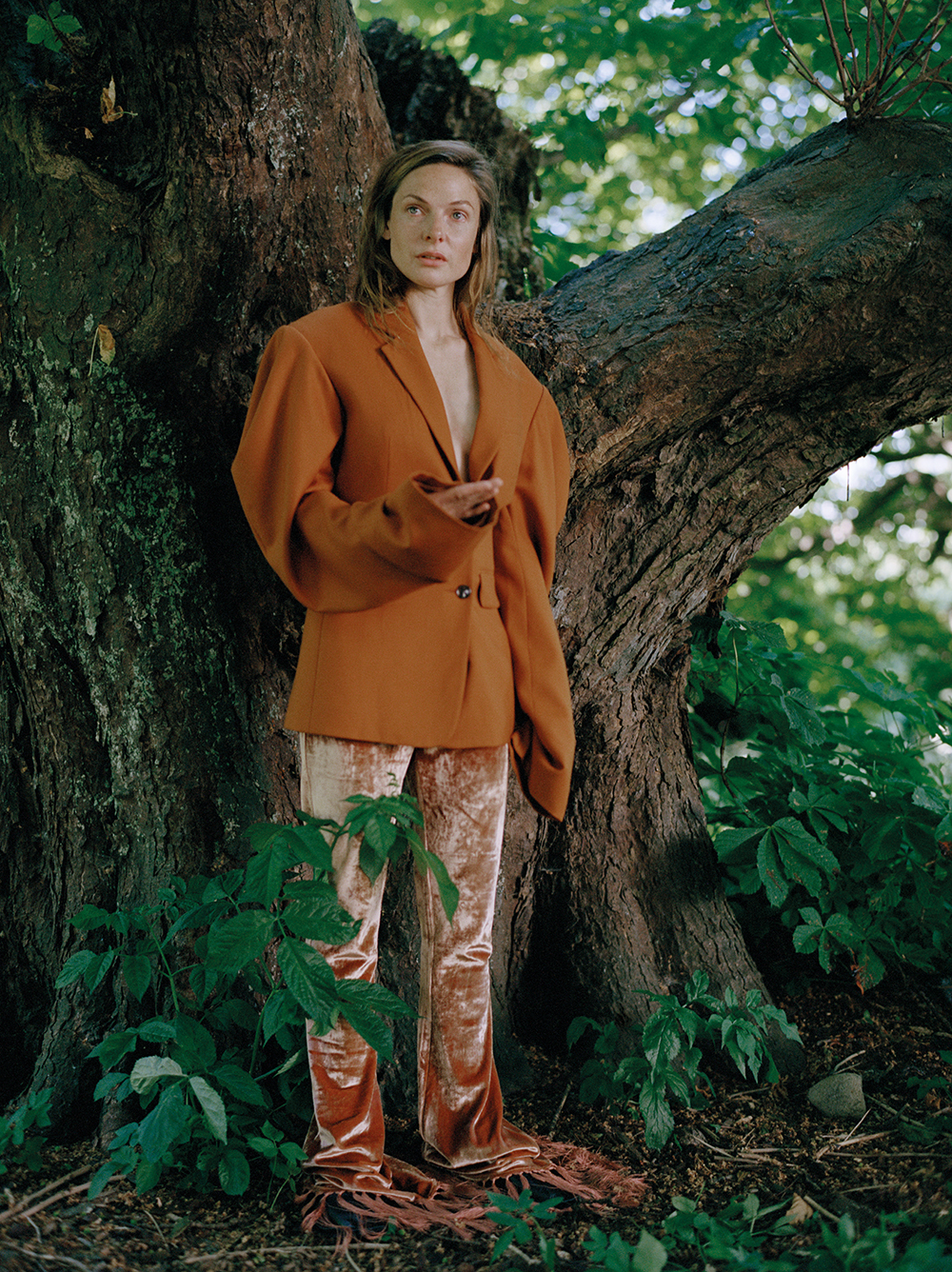
Wool suit jacket & velvet pants – ACNE Studios

Wool Shirt & brass necklace – ACNE
Studios Boots – Ganni
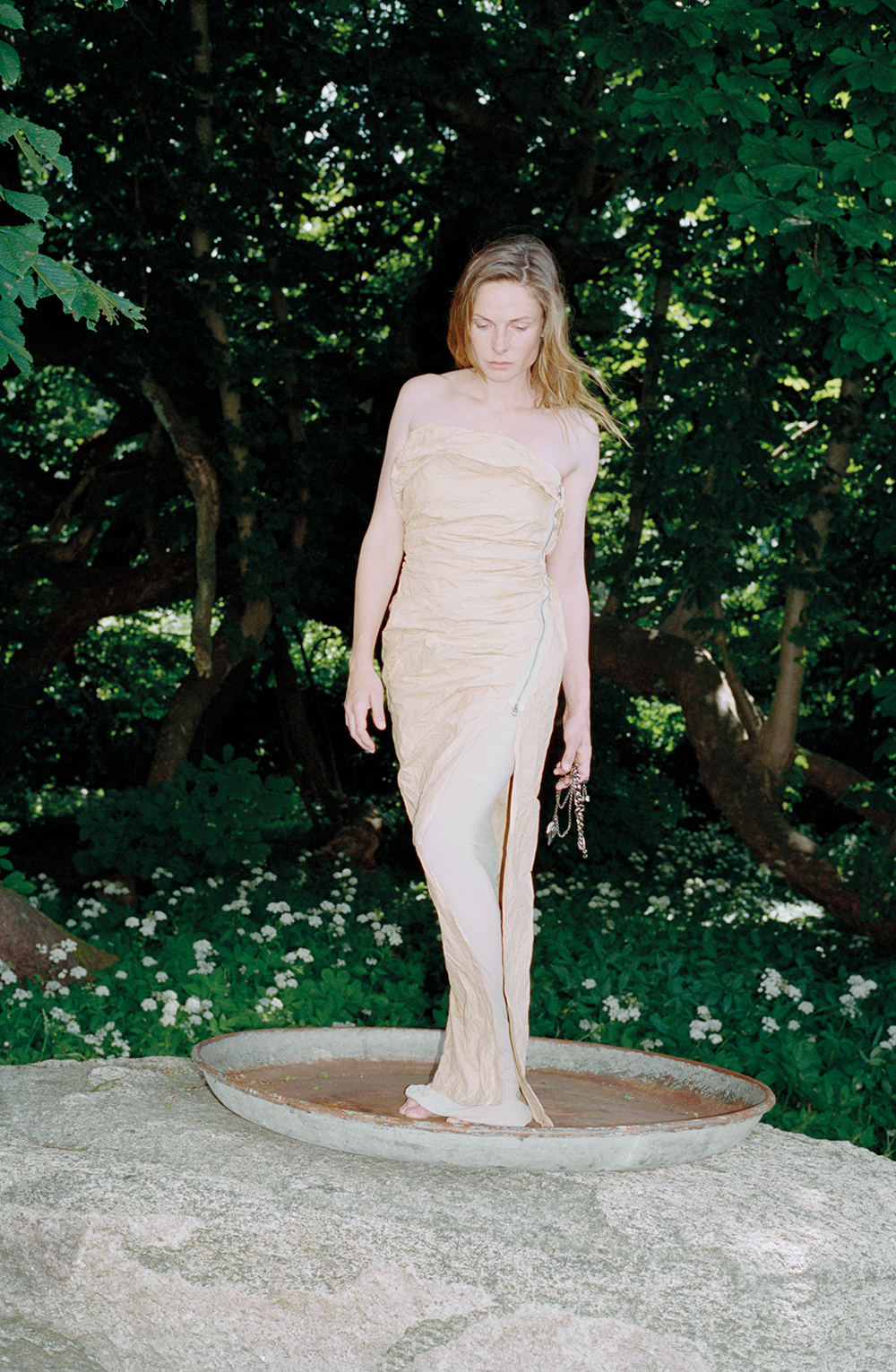
Wax paper dress & brass necklace – ACNE Studios
***
Photographer: Josefine Seifert
Stylist: Louise Borchers
Make up & hair: Emillie Aagaard Andreassen
Production assistant: Tove Karl







